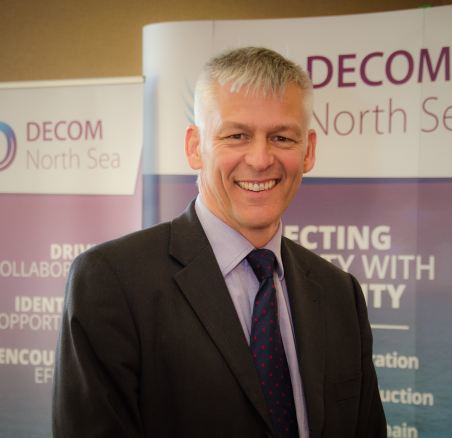
With the panel session completed, the last business card exchanged and another memorable Decom Offshore conference drawn to a close, I think I have just enough energy left to reflect on what’s been an important week for Decom North Sea.
Firstly, I am delighted to report that the inaugural Decom North Sea awards, held on 22 May, were a resounding success and an excellent illustration of the genuinely game-changing activity currently taking place in the decommissioning sector.
Nearly 200 industry professionals came together to celebrate innovation, collaboration and commitment. As an awards event dedicated to late life and decommissioning activity, it’s a global first and, I believe, a real reflection of Decom North Sea’s own commitment to ensuring we champion our members’ work and reinforce those three important ethos mentioned above.
Plans are already afoot for the Decom North Sea Awards 2019; based on this year’s event, this is set to become a diary fixture for years to come. Look out for entry, sponsorship and booking details early next year.
Decom North Sea doesn’t like to do things by half, and the Decom Awards were followed the next day by Decom Offshore 2018. The sixth annual conference and exhibition was, as ever, a busy and informative day for over 350 global delegates.
We know the late life and decommissioning market presents its challenges, particularly clarity of supply chain capability/experience and operator requirements. Decom Offshore is there to help mitigate those challenges as much as possible, providing opportunities to engage with each other, gain market intelligence, regulator opinion and operator/supply chain insight and lessons.
For example, our exhibition of supply chain companies and professional bodies was the largest ever. They know Decom Offshore offers an unrivalled opportunity to showcase their technology and services to the right audience.
Equally, many of our speakers took advantage of our event app, in order to engage directly with their audience, allowing them to ask the delegates their opinion on a number of matters. Not only was this hugely interesting on the day, we also anticipate that these insights will be used by all to shape future strategies, ensuring they are fully aligned with market requirements.
I believe that this really is the ultimate endorsement of Decom Offshore – when industry sees it as an opportunity to really tap into the opinions of those who attend, and
I’d like to share a couple of those opinions with you, to give you an idea of our delegates’ thoughts:
Q: What are the most important issues Decom North Sea can address for its members?
A: Market forecasting and intelligence
Q: Where do the greatest opportunities for creating a decom cost-reducing game-changer sit?
A: Well Plugging & Abandonment
Q: How can the UK decommissioning supply chain best continue to operate in a climate of ever-reducing costs?
A: Technological innovation and export of services and skills
A number of additional points were raised during the day, which, within the confines of this column, neatly sum up the current North Sea decommissioning sector.
It’s important to remember that more than 90% of North Sea decommissioning is yet to take place. There are lots of decommissioning lessons yet to learn and share, and a focus on this area is expected to yield considerable benefits. Equally, this means there are lots of opportunities yet to present themselves.
With a large number of projects currently under consultation with the regulators, decommissioning programme approvals are anticipated to increase significantly in 2019.
However, we can’t expect this to necessarily convert directly to a similar number of North Sea decom projects.
Whilst these will eventually take place, it’s common for timings to adjust, as the full timescales begin to reveal themselves. A discrepancy between estimated projects and projects approved is to be expected.
In the past year, we’ve seen an uptick in the sale and purchase of mature assets, with the expectation of field life extension. Naturally, this can lead to questions regarding the future of North Sea decommissioning.
This doesn’t mean decommissioning is taken off the table, it simply moves the cessation of production and subsequent decommissioning dates further into the future. This is highly positive, in line with MER UK, and good for the wider industry.
Recommended for you
